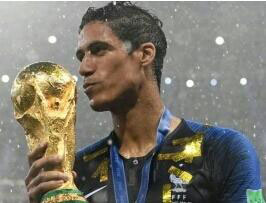By Ras Wadada
What was forecast, with ceaseless negativity, in the British and American Press, particularly, turned out to be one of the best of the 21 editions, of the “Greatest show on Earth’ witnessed in over 88 years of its existence.
Even as the final dust settles in champion country France, celebrations, debates and memories related to Russia 2018 continue to arouse interest around the world. It has been a week since the final chapter was indelibly written by a young French team nurtured and directed by Coach Didier Deschamps whose squad and team selections as well as tactical game plans came under relentless criticism.
The drama-filled, 25-match days spread over 32 days, delivered like no other from the very opening encounter, June 14th when the host delighted their nation and shocked the world with a commanding 5-0 demolition of Saudi Arabia in a match that was anticipated to go either way or end in a stalemate. The closing act, on July 15th at the same Luzhniki Stadium in Moscow City, went one goal better as the talented France staved off the early challenge of the resilient Croatians for a deserved 4-2 triumph, the second grasp, for the nation in 20 years, on the most coveted trophy in sport.

The first 15 days of daily group stage competition was not short of shocking and upsetting results, nor record achieving and disappointing performances during the 48 matches. Only Egypt and debutant Panama failed to register a point while all 32 nations scored at least two goals, with Croatia and Uruguay winning their three group matches without conceding a goal. Belgium was the only other team to win all their group matches though they conceded two goals.
The biggest shock of the opening round must be the early exit of defending champions Germany who went under to Mexico 0-1 and South Korea 0-2 while, in between, they had the better of Sweden 2-1 to end their worst performance at a World Cup finals. The Germans became the third consecutive Cup holder to be booted out of the quadrennial showpiece at the group stage following Italy in 2010 and Spain in 2014.
France also suffered the same fate in 2002. The non-advancement out of the group stage, for the first time since 1982, by the five African teams was another shocker.
The use of the Video Assistant Referee (VAR) was pivotal in the record number of penalty kicks awarded and there was also a new record established for own-goals, along with the many twists and turns and new milestones. Seven of the 29 penalties awarded were either saved or missed the target in a new record for a single tournament that surpassed the 18 conferred at France 1998.
The own-goal calamity also escalated in Russia as it doubled the previous record of six scored at the said France 1998.
Portugal’s captain Cristiano ‘CR7’ Ronaldo and Mexican Rafael Marquez also etched their names into the records of World Cup football during the group phase. Ronaldo’s hat-trick of goals in his team’s opening game versus Spain was the reason the Iberian derby ended in a 3-3 stalemate and was the 51st treble in World Cup history and coincidentally the 51st as well for ‘CR7’ in matches for country and club. His first conversion, from the penalty mark, made him only the fourth player to score in four different World Cup tournaments, joining the iconic Pele of Brazil and Germany’s Uwe Seeler and Miroslav Klose. Meantime, the 39-year-old Marquez became the third player to participate in five tournaments, with compatriot Antonio Carbajal and Germany’s Lothar Matthaus realizing the feat before. Egypt’s Essam El-Hadary at 45 years, 161 days old became the oldest player to make his debut at and play in a finals’ tournament, and, as a bonus, he also made a save to become the oldest goalkeeper to save a penalty.
The only dull moment that failed to produce a goal was the 0-0 draw between France and Denmark after both sides had already advanced from their group.
The round of 16 to start the knockout segment was also loaded with surprises of the unthinkable as Russia outlasted Spain in one of three penalty shoot-outs while France and Uruguay outclassed the pretentious Argentina and Portugal 4-3 and 2-1 respectively. Croatia proved to be better prepared than Denmark in their shoot-out while England broke the jinx of penalty shoot-out failures, at World Cup finals, to get past Colombia. Elsewhere it was easy sailing for Brazil over Mexico 2-0 and by Sweden 1-0 over Switzerland.
The stand-out match of the round saw Belgium come-from-behind to snatch a 3-2 victory against Japan. The duel had fans on their feet throughout and, for many, this was the game of the tournament and it ended with, perhaps, the goal of the tournament on the stroke of fulltime. For the first time in 48 years a team had come back from a 2-0 deficit and win, like Germany against England in the quarter-final 3-2 win at Mexico 1970.
The quarter finals brought an end to the South America’s challenge as France humbled Uruguay 2-0 and Belgium rode their luck on the back of goalkeeper Thibaut Courtois’ brilliance to stop Brazil 2-1. England also had an effortless passage with a 2-0 success against Sweden, but Croatia was yet again stretched into a penalty shoot-out that ended the fairy tale run of the hosts.
The all-European semis then separated the real contenders from the pretenders; France clinically bringing a halt to Belgium’s claim for a place in the final dance, thanks to defender Samuel Umtiti’s header in the 51st minute and Croatia exhibiting great resolve in being extended for an unprecedented third consecutive 120-minute game to dash the hopes of the English nation by a 2-1 margin. Kieran Trippier netted a beautiful spot kick as early as the fifth minute of play and England held the lead until the 68th minute when Ivan Perisic equalized. In extra time, the 32 year-old Mario Mandzukic sent his country into their first final when he capitalized on a defensive lapse, inside the area, to score the winner in the 109th minute.
No other two sides deserved to be in the final game of Russia 2018 and while both nations were confident of lifting the title going into the championship match it was the French who survived the early pressure applied by the more aggressive Croats to comprehensively win, but not without more drama.
France’s opening goal in the 18th minute, from a spot kick by Antoine Griezmann skimmed off the head of Mandzukic for the first own-goal in a final and 12th of the tournament, but Perisic’s sublime left-footer from just inside the box cancelled out the lead 10 minutes later. Seven minutes from half time, Les Bleus regained the lead thanks to a controversial penalty that was not blown for by Argentine referee Nestor Pitana, but persistent appeals by the French for hand ball on Perisic was finally reviewed on the advice of the VAR and Griezmann converted from the spot. Two stunning goals from outside the area within six minutes took all the fight out of the Croatians and the contest was as good as over. First Paul Pogba netted with a left-footer in the 59th minute and then 19 year-old Kylian Mbappe fired a low right-booter in the 65th.
The final dramatic play was reserved for Mandzukic who cashed in on Captain Hugo Lloris’ goalkeeper howler, in the 69th minute, to reduce the score and more importantly become the first player to score for both sides in a World Cup final.
It was a fitting climax to a tournament that attracted three million visitors, mostly South Americans and Asians, and where it was reported that the atmosphere and hospitality in the 11 host cities were exceptional throughout the one-month party.
The Russians have set the bar to heights that the next host Qatar can feed off so as to deliver higher heights in 2022 when the showpiece will be staged for the first time in the Middle-East, in November-December. While we might not all agree, there can only be few who will dispute that Russia 2018 was incredibly unthinkable and definitely memorable.






